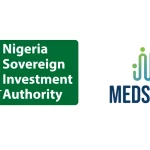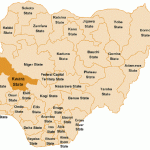Economy
Nigeria’s Inflation to Hit 12% in 2019—Fitch
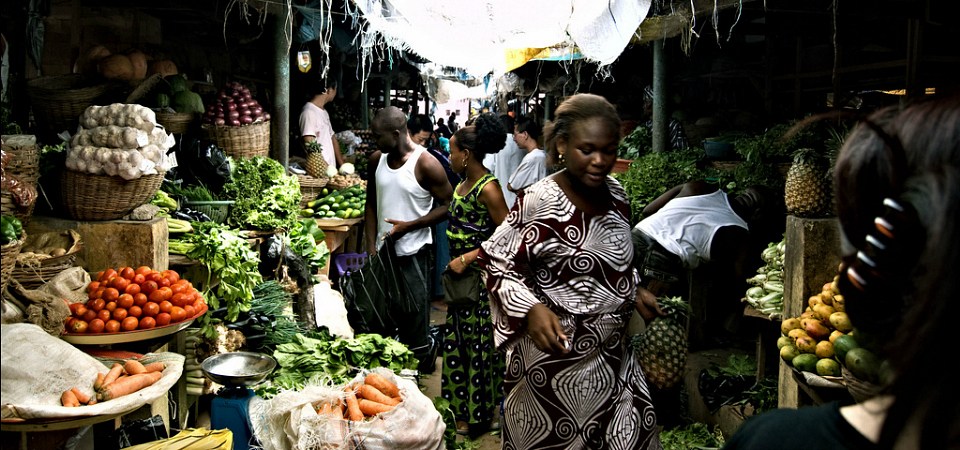
By Dipo Olowookere
Global rating agency, Fitch Ratings, has said the path to full economic stability and recovery for the Nigerian economy is very rough.
In a statement affirming the nation’s Long-Term Foreign-Currency Issuer Default Rating (IDR) at ‘B+’, Fitch said weak party discipline in parliament and frequent disagreements between the presidency and legislature point to a continued high risk of delays to parliamentary approval of key legislation.
The rating firm said it expects policy continuity with the implementation of only piecemeal reforms, resulting in slow progress on tackling long-standing impediments to growth and weaknesses in macroeconomic management.
While it projected that inflation will average close to 12 percent in 2019-2020, well above the projected current ‘B’ median of 4.8 percent, propped up by cost-push factors, the Gross Domestic Product (GDP) growth is anticipated to average 2.2 percent in 2019-2020, below its previous 10-year average of 4.2 percent and the current ‘B’ median of 3.4 percent.
Business Post reports that in April 2019, according to the National Bureau of Statistics (NBS), the country’s inflation rose to 11.37 percent year-on-year from 11.25 percent year-on-year in March 2019.
Fitch noted that high unemployment and inflation will constrain private consumption while investment is held back by tight credit supply, a weak business climate and regulatory uncertainty in the oil sector.
It said a large infrastructure deficit, which is illustrated by acute power supply shortages and security challenges, also dampen the medium-term growth outlook.
The renowned rating agency disclosed that Nigeria’s ratings are supported by the large size of its economy, a track record of current account surpluses and a relatively low general government (GG) debt-to-GDP.
“This is balanced against poor governance and development indicators, structurally low fiscal revenues and high dependence on hydrocarbons. The rating is also weighed down by subdued GDP growth and inflation that is higher than in rating peers,” it said.
Continuing, it stated that Nigeria’s fiscal performance mostly remains a function of fluctuations in oil revenues, noting that the implicit subsidy of petrol prices (around 0.6% of GDP in 2018), the gradual clearance of joint-venture (JV) cash call arrears (outstanding stock of 1% of GDP at end-2018) and the conversion of government oil proceeds to naira at a below-market exchange rate continue to constrain budget receipts from hydrocarbon extraction.
“Fitch estimates that the GG deficit narrowed to 3.6% of GDP (federal government, FGN: 2.3% excluding transfers to state and local governments, SLGs) in 2018 from 4.5% in 2017 (FGN: 3.2%), mostly reflecting the recovery in oil prices.
“Fitch forecasts the GG deficit to widen to 3.8% of GDP (FGN: 2.6%) in 2019 and further to 4.6% in 2020 (FGN: 3%) as the rise in oil production with the coming on stream of the Egina oilfield will be offset by the decline in oil prices under our baseline. Public finances are vulnerable to disruptions to production caused by recurrent acts of vandalism or other force majeure affecting Nigeria’s aging oil infrastructure. A $10 change per barrel in the Brent oil price against our assumptions would, all else equal, impact the GG balance by around 0.6% of GDP.
“Nigeria’s particularly low non-oil fiscal revenues averaging only 3.7% of GDP over 2016-2018 are a key rating weakness, reducing the fiscal space and resulting in a high fiscal Brent breakeven price of USD129 per barrel in 2019 and USD149 in 2020, according to Fitch’s estimates. A two-thirds rise in the minimum wage entered into force in April and could cause pressures on public finances, particularly for cash-strapped SLGs, although there is high uncertainty regarding its effective implementation date and fiscal cost. The government is contemplating offsetting measures, including a VAT rate increase, which faces strong opposition across the political spectrum.
“Interest payments consumed 27% of GG revenues (FGN: 53%) in 2018 based on Fitch’s estimates, double the current ‘B’ median of 13% and will rise to 30% of revenues (FGN: 65.6%) in 2020, highlighting the risks to debt sustainability arising from low fiscal receipts. The authorities aim to contain the rise in the interest cost by substituting external concessional and commercial borrowing to onerous domestic financing. They also plan to reduce debt through partial privatisations of oil JV assets, which we do not expect to materially reduce their oil revenues.
“GG debt will rise from 25% of GDP (FGN: 20%, including central bank overdrafts) in 2018 to 28.2% of GDP (FGN: 22.4%) in 2020, still well below the projected current ‘B’ median of 56%, under Fitch’s forecasts. Around 71% of GG debt was naira-denominated at end-2018, limiting refinancing and exchange rate risks but high direct and indirect foreign holdings of local-currency debt expose Nigeria to shifts in investor sentiment and global funding conditions. The debt of the Asset Management Corporation of Nigeria (AMCON) of 3.2% of GDP at end-2018 constitutes a contingent liability for the sovereign, and could rise in the context of high non-performing loans in the banking sector of 11.7% of total bank loans and an elevated proportion of restructured loans,” a statement from the agency said.
Economy
FG Saves N6trn in Fuel Subsidy Payments in 2025—NMDPRA Chief
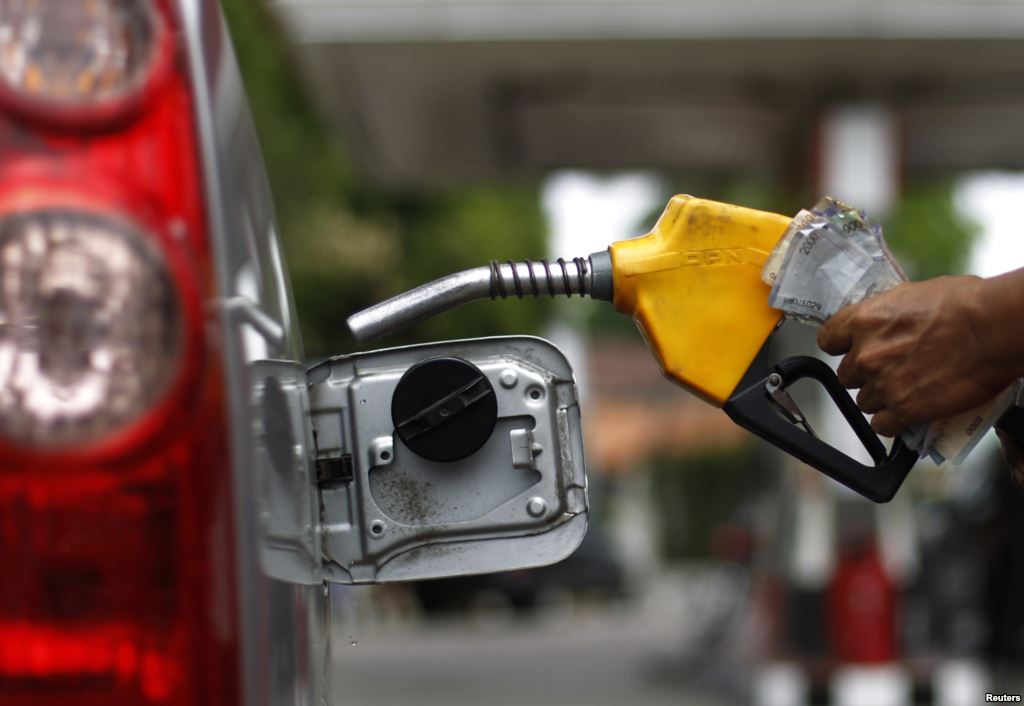
By Adedapo Adesanya
The chief executive of the Nigerian Midstream and Downstream Petroleum Regulatory Authority (NMDPRA), Mr Saidu Mohammed, has revealed that bold economic reforms by President Bola Tinubu’s administration saved the country over N6 trillion on petroleum product imports in just the first nine months of 2025.
Mr Mohammed disclosed this while speaking at the Nigeria International Energy Summit (NIES) in Abuja, said the savings were the result of full downstream deregulation, harmonisation of the forex market, and the trading of crude and petroleum products in Naira.
He added that these bold moves have created stability in the downstream petroleum market, encouraged investment, and ensured a sufficient supply of petroleum products across the country.
The NMDPRA boss also revealed that the nation’s refining capacity is expected to surpass 1 million barrels per stream day (bpsd) in the medium term.
He said the surge in domestic refining capacity is being driven by a combination of new refinery investments, the rehabilitation of existing Nigerian National Petroleum Company (NNPC) Limited refineries, and strategic private-sector participation.
According to him, the planned investments in other refineries, along with issued Licences to Establish (LTEs) for new facilities, will continue to expand Nigeria’s refining footprint, reducing dependence on imported products and stabilising domestic supply.
He said: “For decades, our downstream value chain has been associated with negative sectoral performance indicators such as infrastructural deficit, weak market structures, sub-optimal supply chain efficiency, inadequate investment, poor regulatory compliance, and unacceptable operational safety and environmental indices.
“Today, I am pleased to affirm that this narrative is rapidly changing and that the sector is truly witnessing the early but irreversible signs of a renaissance-type transformation that is driven by bold reform; enabled by investment; and sustained by effective market and operational regulatory enablement.
“In the few years of the operationalisation of the new legal framework of the Oil and Gas sector in Nigeria (PIA 2021), Nigeria’s downstream sector has evolved into a fully liberalised market and is no longer defined by scarcity and supply uncertainty.
Supply stability has consistently ensured sufficiency of all Petroleum products. The pricing structure of the downstream sector is becoming more driven by the fundamentals of the market and generally attaining the stability level required for encouraging investment in this expansive sector of the economy.
“The supply chain landscape of the sector, which depended significantly on import of nearly all Petroleum Products for a long time, is rapidly transforming with growing supply through the nation’s domestic refining capacity, expanding gas-based alternative fuels, improved logistics, and increased private-sector participation.
“At the heart of this transformation stands the Dangote Petroleum Refinery, the largest single-train refinery in the world with an installed capacity of 650,000 barrels per stream day (bpsd), which is currently contributing a significant portion and in some cases 100 per cent of our domestic requirement of Petroleum Products. The optimal operationalisation of the plant’s installed capacity and future upscaling of the plant is undoubtedly needed to fulfil the national aspirations of making Nigeria a regional and continental energy hub.
“The capacity for enhanced domestic supply of Petroleum product in Nigeria will continue to grow as the planned investments in our refinery sector mature. We are optimistic that the issued Licences to Establish (LTEs) refineries, which are being progressed through various levels of completion, coupled with the rehabilitation of the NNPCL refineries, will improve the overall installed refining capacity in Nigeria to well over 1 million bpsd in the medium term.
“The bold economic reforms of President Bola Tinubu have created the renaissance that the downstream sector is enjoying and would continue to leverage upon for sustained sectoral growth in the future. The cumulative impact of the full deregulation of the downstream sector, the harmonisation of the forex market, the incentivization and deepening the use of gas and the trading of crude and product in Naira has reduced the fiscal economic losses of importing Petroleum Product by over N6 trillion in the 1st nine months of 2025.”
Economy
Nigeria Targets 10bscfd Gas Production in Next Four Years

By Adedapo Adesanya
The federal government says Nigeria is targeting gas production of 10 billion standard cubic feet per day (bscfd) by 2030, positioning natural gas as a cornerstone of national energy security and economic prosperity.
The Minister of State for Petroleum Resources (Gas), Mr Ekperikpe Ekpo, said this while delivering a ministerial address at the ninth Nigeria International Energy Summit (NIES) 2026 in Abuja.
The Minister said the government’s efforts were yielding tangible results, with Nigeria’s gas production maintaining an upward trajectory in 2025, averaging between 7.5 and 7.6bscfd.
He disclosed that domestic gas supply exceeded two bscfd for the first time, marking a historic milestone for power generation, industrial use and household consumption.
The Minister also said significant progress in environmental performance, with gas flaring reduced to some of the lowest levels recorded in recent years, in line with Nigeria’s commitment to end routine gas flaring by 2030.
He noted that investor confidence in the gas sector had been strengthened, citing Final Investment Decisions (FIDs) in key upstream gas projects supported by improved regulatory clarity under the Petroleum Industry Act (PIA).
“Across the midstream and downstream segments, pipeline infrastructure, processing facilities and gas-to-power projects have expanded, improving connectivity, boosting domestic utilisation and supporting cleaner cooking solutions, job creation and industrial stability.
“Under President Bola Tinubu’s Renewed Hope Agenda, government policy prioritises the expansion of domestic gas infrastructure while strengthening Nigeria’s presence in regional and global gas markets.
“This includes facilitating investments in gas processing, storage and distribution, as well as accelerating gas-to-power projects aimed at addressing energy poverty and enhancing industrial competitiveness,” he said.
The minister emphasised that Nigeria’s energy future was inseparable from peace, partnership and shared responsibility, calling on governments, investors, development partners, host communities and civil society to move from dialogue to decisive action.
“Our collective task is to build an energy system that powers prosperity, strengthens stability and supports regional integration,” he said.
He said Nigeria’s energy strategy is firmly aligned with global energy transition realities while responding to Africa’s unique development challenges, including widespread energy poverty, limited industrial capacity and inadequate access to reliable power.
“While the world moves towards lower-carbon systems, Africa must pursue a transition that is not only green, but also just, inclusive and development-driven.
“Nigeria is leveraging its abundant natural gas resources to balance climate responsibility with economic development, positioning gas as the backbone of industrial growth, job creation and expanded energy access,” he said.
Economy
Transcorp, DMO, CardinalStone, Chapel Hill Denham, Others Win at NGX Made of Africa Awards
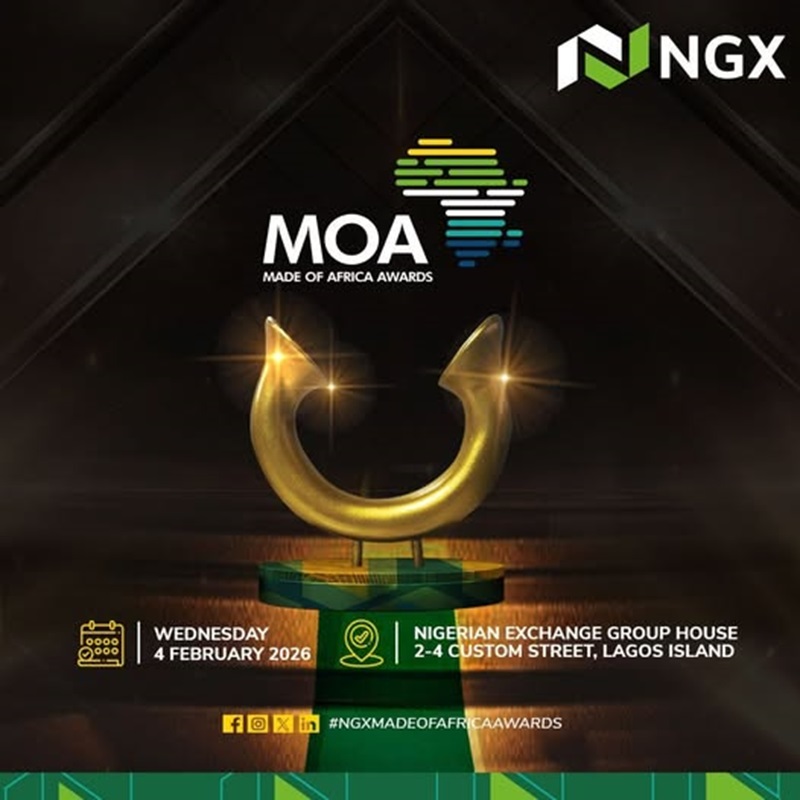
By Aduragbemi Omiyale
The 2025 Made of Africa Awards, hosted by Nigerian Exchange (NGX) Group Plc, paraded an array of winners, including brokers, issuing houses, trustees, fund managers, listed companies, and other market participants.
The event was to reward excellence in value delivery, compliance, and market impact, with Transcorp, the Debt Management Office, CardinalStone, Chapel Hill Denham, and MTN Nigeria Communications as recipients.
Business Post reports that the other recipients were First Trustees Limited as the Best Trustees in Terms of Deal Value, Legend Internet as the Market Debut Excellence award winner.
Further, CardinalStone Securities emerged as Equity Trader of the Year and Broker of the Year, Capital Express Securities won ETPs Trader of the Year, and Stanbic IBTC Stockbrokers was named Fixed Income Trader of the Year. Chapel Hill Denham received awards for Fund Manager with the Largest Listed Fund Size and Market Operator with the Highest Value of Foreign Portfolio Investment Transactions.
Mainstreet Capital and APT Securities and Funds jointly won Issuing House with the Highest Number of Primary Market Equity Transactions, while Anchoria Advisory Services led in corporate bond issuances. Dangote Cement was named Best Issuer in Terms of Fixed Income Listings, BUA Cement received the award for Most Compliant Listed Company, and Transnational Corporation Plc was honoured for Capital Market Excellence in Equity. Network Capital was named the Most Compliant Trading License Holder, United Capital Securities won the Best Sponsoring Trading License Holder and Banwo and Ighodalo received recognition for legal advisory value in capital market transactions.
Special recognition went to the Debt Management Office for fixed income market development and to the Capital Markets Correspondence Association of Nigeria for capital market reporting, and Lambeth Capital/Bamboo Systems Technology were recognised for onboarding the highest number of new retail investor accounts.
The chairman of NGX Group, Mr Umaru Kwairanga, said the awards underscore the role of market stakeholders in strengthening investor confidence and improving market standards.
“Their achievements set a benchmark for performance, integrity and innovation across the capital market,” he said, adding that sustaining this level of discipline and transparency is essential to maintaining the trust of both domestic and international investors in Nigeria’s financial markets.
The chief executive of NGX Group, Mr Temi Popoola, said, “Operational efficiency and cooperation across the ecosystem are increasingly important as trading activity diversifies and investor expectations continue to rise.”
On his part, the Executive Commissioner for Operations at the Securities and Exchange Commission (SEC), Mr Bola Ajomale, said the awards underscore the value of compliance and transparency in market development.
“Recognition through the Made of Africa Awards reinforces the importance of adherence to market rules and standards. When operators demonstrate accountability and professionalism, it strengthens investor confidence, ensures market integrity, and supports sustainable growth across Nigeria’s financial markets,” he said.
The chief executive of NGX Limited, Mr Jude Chiemeka, said recognising strong performance across the ecosystem supports deeper market participation and long-term capital mobilisation.
-

 Feature/OPED6 years ago
Feature/OPED6 years agoDavos was Different this year
-
Travel/Tourism9 years ago
Lagos Seals Western Lodge Hotel In Ikorodu
-

 Showbiz3 years ago
Showbiz3 years agoEstranged Lover Releases Videos of Empress Njamah Bathing
-

 Banking8 years ago
Banking8 years agoSort Codes of GTBank Branches in Nigeria
-

 Economy3 years ago
Economy3 years agoSubsidy Removal: CNG at N130 Per Litre Cheaper Than Petrol—IPMAN
-

 Banking3 years ago
Banking3 years agoSort Codes of UBA Branches in Nigeria
-

 Banking3 years ago
Banking3 years agoFirst Bank Announces Planned Downtime
-

 Sports3 years ago
Sports3 years agoHighest Paid Nigerian Footballer – How Much Do Nigerian Footballers Earn











